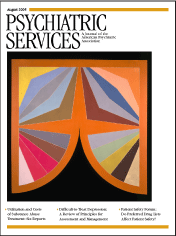Schizophrenia, Culture, and Subjectivity: The Edge of Experience
This book is a collection of papers by anthropologists, psychiatrists, psychologists, and historians who are currently studying schizophrenia, its subjective dimensions, and the cultural processes through which these dimensions are experienced. The book's editors are Janis H. Jenkins, a professor of anthropology and psychiatry in the United States, and Robert J. Barrett, a professor of psychiatry from Australia.
The 13 chapters of this volume are divided into three parts. The first part deals with culture, self, and experience. The second part includes some approaches to investigating the experience of schizophrenia, and the final part looks at subjectivity and emotion. The first chapter is written by Jenkins, who, drawing on multiple cultural theories, examines the cultural grounding of subjective experience in schizophrenia as a paradigm for understanding fundamental human processes. The book includes extensive documentation that the outcome of persons with a diagnosis of schizophrenia and related disorders in the industrialized world is less favorable than in the developing countries.
The meaning of culture and its relationship is extensively interrogated in one chapter. There is a fascinating exposé of the importance of understanding the ethnographic underpinnings in order to study the comparative cultural phenomenology, using as an example the Iban of Borneo and interpreting schizophrenia by ethnographic means from Australia. Researchers from South India argue that to understand the influence of culture on the evolution of schizophrenia, one must begin with the ways in which patients and family members situate themselves in a world that is deeply affected by psychosis.
In the second part of this volume, personal experience of schizophrenia is investigated in four different contexts: central Javanese culture of Indonesia; pagalami (madness) in Bangladesh; homeless persons with mental illness in Bogota, Columbia; and symptoms of colonialism among the Yoruba people of Southwest Nigeria. Each of the chapters is outstanding in its depth and clarity. The final part of the book, which deals with subjectivity and emotion, includes a detailed account of the experience in the Swahili culture of Zanzibar. The other chapters deal with the concept of subjectivity in dispute, negative symptoms, common sense and cultural disembedding in the modern age, and the subjective experience of emotion in schizophrenia.
This is a marvelous book that examines the impact of culture and subjective experience in schizophrenia. Instead of applying one set of criteria to all patients, as we generally do in assigning a diagnosis of schizophrenia, this book fosters awareness about conceptualization of the interaction between social and cultural processes and self processes linked to psychosis. While bringing significant research from varying cultures and subcultures belonging to different religious affiliations, this volume raises enormous questions and provides opportunity for future research.
These are times when cultural sensitivity and cultural competence are hot subjects. Schizophrenia, Culture, and Subjectivity: The Edge of Experience has certainly succeeded in its objective of bringing findings of social science research to clinicians for applications in their day-to-day practice with many examples from around the world. This book stimulates the interest of clinicians to understand the distinctive configuration of cultural influences at play in their patient's context. The book is a great resource for all mental health professionals seeking to understand culture and subjective experience in schizophrenia.
Dr. Srinivasaraghavan is professor and chief of the division of community and public psychiatry at the Southern Illinois University School of Medicine and medical director of Choate Mental Health Center in Anna, Illinois.



